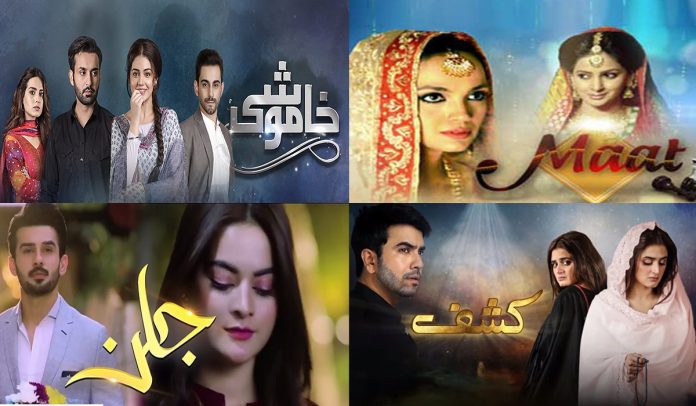There was a time when Pakistani television was considered to be superior to the country’s film industry. The reason for the edge was the meaningful and relatable content often churned out by PTV, STN, and then later, some cable and satellite networks. In the past few years, however, we have seen some unsavory themes taking over the medium.
Among many such themes fed to the audience is pitting two sisters against each other over a man. Be it Saba Qamar and Amna Sheikh in Maat, Iqra Aziz and Zara Noor Abbas in Khamoshi, or Hira Mani and Sabeena Farooq in Kashf, drama producers are normalizing love triangles with two sisters and a mutual love interest.
Problematic trends
This is highly problematic as such stories create a toxic impact on the audience. Television serials are actively viewed by their target audience i.e. the women, and are seen as having some similarity to real-life situations by many. Thus targeting sibling relationships will just add to the negativity and conflict being paraded as entertainment.
Such dramas also show sisters wishing death upon each other such as Iqra’s character in Khamoshi, or creating trouble for their sibling, such as Sabeena’s character in Kashf. Some critics and media observers have in the past have considered toxic television themes to be damaging to our social fabric.
An even more disturbing factor is that in most cases the male love interest is either committed or married to one of the sisters while the other one sets her eyes on him. This also violates the values and norms attached to the brother in law-sister in law relationship.
The latest: ‘Jalan’
The latest venture to join the party is Emaad Irfani’s next co-starring Minal Khan and Areeba Habib, titled Jalan.
Interestingly, this is not the first time a drama titled ‘Jalan’, that too with a similar story too has aired on TV. There have been three seperate dramas named ‘Jalan’ that have been aired on different channels till date.
The first ‘Jalan’ starring Maya Ali and Sajal Aly aired on Geo Entertainment in 2016 (later re titled as Ladoo Main Pali) . The drama once again showed a happily married couple being sabotaged by ‘the other woman’. The second ‘Jalan’ starring Saboor Aly aired in 2017 on A-Plus and the story revolved around two sisters. Surprise Surprise.
The third ‘Jalan’ is about to be aired soon on ARY Digital and as the teaser suggests, the protagonist of the show Nisha, essayed by Minal, falls for her brother in law and then creates trouble in the married couple’s paradise. The dialogues shown in the promos also give away disturbing hints of a sibling war.
Nisha seems to be glorified despite being a morally flawed character. One of her dialogues in the promo is “Main apni jang jeetnay ke liye kisi bhi had tak jaa sakti hoon”. Which takes sibling rivalry to another low. To have such a character being promoted as the play’s central character is something we cannot quite understand.
What is even more disappointing is that such characters are performed by leading actresses who have a significant fan following and influence on the television audiences. A section of the audience might see this behavior as normal since their favorite actress is essaying those roles.
Stars are not happy
Surprisingly, TV dramas hardly show two brothers wooing the same woman or fighting over a mutual love interest. In fact, some of the recent examples such as HUM TV’s Dilruba starring Hania Amir, showed a brother sacrificing his feelings for his cousin when she tied the knot with his younger brother.
The Kamli of tinsel-town, Saba Qamar recently called out this wave of content in an interview stating that she is tired of reading scripts where two sisters are falling in love with the same guy and that then entire drama revolves around the problem. She cited the example of Maat and said that she has also done a play like that but she wouldn’t want to repeat it in her career.
Actor Zahid Ahmed recently discussed this repetition of similar themes on Iffat Omar’s show, stating that the television audience is craving for novelty. This is why he did Ishq Zah-e-Naseeb as it was different from regular dramas and thus became a success. He added that this is the time when the audience wants to see a variety of content and that they should be served with a range of interesting material.
Final word
With the OTT platforms picking pace in the South Asian markets, access to international content is easier than ever, therefore television producers need to put a stop to churning out the same regressive content in order to stay with the evolving times. They should also be mindful of their social responsibilities about portraying family ethos on TV screens.




